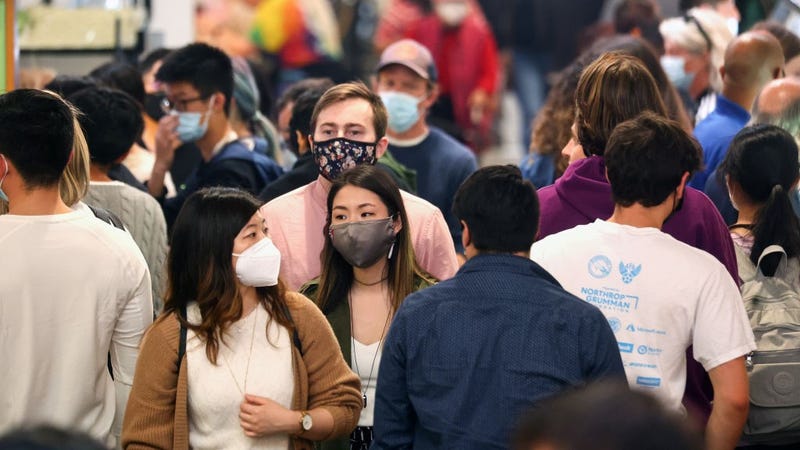
Just because new cases of COVID-19 have declined drastically since the omicron variant spike throughout the winter holiday season, many Americans still do not feel that their lives have returned to what they were like prior to the pandemic over two years ago.
In fact, only 27% of Americans said that their lives have basically returned back to normal, according to a recent Kaiser Family Foundation poll that was released on Wednesday.
42% of people said that they are doing some activities, but not everything they would have done freely before the pandemic.
The opposite sides of the poll were relatively close, as 17% said they are doing very few activities, while 14% said they never changed their activity habits during the pandemic at all.
The poll "surveyed 1,243 US adults on March 15-22, using a combination of live telephone interviews and online interviews to reach a nationally representative sample," per CNN.
Looking at the poll by political party alignments, only 21% of Democrats said their lives have basically returned to normal while 35% of Republicans said theirs did. 56% of Democrats said they are doing some but not all the activities they would do pre-pandemic, but only 28% of Republicans said that applied to them.
Mask mandates have been a very controversial topic in the United States since day one of the pandemic, as many people were not willing to wear them at all, while others were loyal to wearing their masks in any public setting. Most states have lifted their mask mandates for going to a restaurant or public gatherings like a concert or sporting event, but a large chunk of people still believe that wearing a mask is important for health and safety right now.
Overall, 59% of people in the poll agreed that people should continue to wear masks in some public places to minimize the spread of COVID-19 and prevent another surge in cases.
The poll then broke that question down by race, political sides, and vaccination status. An overwhelming 88% of Black Americans voted that masks should still be worn in some places, while white Americans were split 49% and 49%. Hispanic Americans were more in favor of wearing masks in some public places, as 69% voted for masks.
85% of Democrats believed that masks should still be worn, while only 30% of Republicans thought that is necessary at this time. 67% of people who have been vaccinated tended to agree with wearing masks, but just 29% of unvaccinated people were in favor of still wearing masks.
"The federal government currently requires people to wear masks on airplanes, trains, and other public transportation," the poll said. "With this requirement set to expire on April 18, adults are split on whether the federal government should let the requirement expire (51%) or extend the requirement (48%)."
72% of Democrats believed that the mask mandate for public transportation should be extended, and 76% of Republicans said it's time to let that mandate expire.
The poll also asked people if they had worn a mask in the last 30 days, and the results were basically split. 51% of people said they wore a mask every time or most of the time, while 29% said they wear a mask some of the time, and just 19% said they never wear a mask in public over the last 30 days.
Work, education, finances, physical, and mental health are just some of the things that have been negatively affected in people's lives by the pandemic. Parents in the poll noted that their children's lives have been affected greatly because of virtual learning and a lack of socialization.
"Almost two-thirds of parents say that the pandemic has negatively affected their children’s education (63%), with 28% saying it had no effect, and 9% who report it had a positive effect," the poll said. "Moreover, over half (55%) of parents say the pandemic has had a negative impact on their children’s mental health, compared to 36% who say it made no difference, and 9% saying it had a positive effect.
"Among all adults, half say the pandemic has had a negative effect on their personal mental health (49%), and 41% say it has had a negative impact on their physical health. Few say it has had a positive effect on either their physical (11%) or mental health (9%)."
When asked, "what, if anything, has been the hardest thing for you and your family?" during the pandemic, the number one response was isolation/not seeing people/missing connections (27%). Not being able to do things or travel was tied for second with the financial impact/inflation that COVID-19 has had, both with 13% of the votes.



